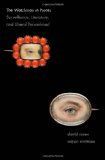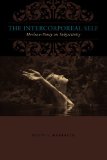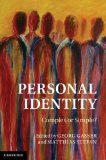June 11, 2013

The Watchman in Pieces: Surveillance, Literature, and Liberal Personhood by David Rosen and Aaron Santesso (Yale University Press, 2013)
(kindle ed.), (amazon.co.uk – 31 July)
Book description from the publisher:
Spanning nearly 500 years of cultural and social history, this book examines the ways that literature and surveillance have developed together, as kindred modern practices. As ideas about personhood—what constitutes a self—have changed over time, so too have ideas about how to represent, shape, or invade the self. The authors show that, since the Renaissance, changes in observation strategies have driven innovations in literature; literature, in turn, has provided a laboratory and forum for the way we think about surveillance and privacy. Ultimately, they contend that the habits of mind cultivated by literature make rational and self-aware participation in contemporary surveillance environments possible. In a society increasingly dominated by interlocking surveillance systems, these habits of mind are consequently necessary for fully realized liberal citizenship.
Comments (0)
- culture,new books,self
January 26, 2013

The Intercorporeal Self: Merleau-Ponty on Subjectivity by Scott L. Marratto (SUNY Press, 2013)
(kindle ed.), (amazon.co.uk)
Book description from the publisher:
An original interpretation of Merleau-Ponty on subjectivity, drawing from and challenging both the continental and analytic traditions. Challenging a prevalent Western idea of the self as a discrete, interior consciousness, Scott L. Marratto argues instead that subjectivity is a characteristic of the living, expressive movement establishing a dynamic intertwining between a sentient body and its environment. He draws on the work of the French philosopher Maurice Merleau-Ponty, contemporary European philosophy, and research in cognitive science and development to offer a compelling investigation into what it means to be a self.
“The Intercorporeal Self amounts to a kind of dialectic between Merleau-Ponty’s thought and naturalism as it functions within contemporary analytic thought and deconstruction as it appears in Derrida’s thought. Marratto constructs argumentation that shows that Merleau-Ponty’s thought cannot be reduced to naturalism and that it does not fall prey to the deconstructive critique. Consequently, Marratto, better than anyone else, shows the contribution that Merleau-Ponty makes to contemporary philosophy.This is an important book. I would even venture to say that it is a genuine work of philosophy.” — Leonard Lawlor, Sparks Professor of Philosophy, Penn State University
“Marratto brings Merleau-Ponty’s phenomenology into a mutually transformative dialogue with the latest trends in the embodied sciences of the mind. His book puts side by side notions of intercorporeality, habit, style, and auto-affection with Gestalt, ecological, sensorimotor, and enactive perspectives on perception and subjectivity. Marratto weaves together the threads of conceptual traditions that saw themselves as incompatible not so long ago. A significant contribution to current efforts toward reconceptualizing the lived body as the matrix of significance and expressive being-in-the-world, and subjectivity as self-affecting, self-initiated movement and intercorporeal attunement to the demands of other bodies.” — Ezequiel A. Di Paolo, coeditor of Enaction: Toward a New Paradigm for Cognitive Science
Google Books preview:
Comments (0)
- new books,self
January 20, 2013

Personal Identity: Complex or Simple? ed. by Georg Gasser and Matthias Stefan (Cambridge University Press, 2012)
(kindle ed.), (amazon.co.uk)
Book description from the publisher:
We take it for granted that a person persists over time: when we make plans, we assume that we will carry them out; when we punish someone for a crime, we assume that she is the same person as the one who committed it. Metaphysical questions underlying these assumptions point towards an area of deep existential and philosophical interest. In this volume, leading metaphysicians discuss key questions about personal identity, including ‘What are we?’, ‘How do we persist?’, and ‘Which conditions guarantee our identity over time?’ They discuss whether personal identity is ‘complex’, whereby it is analyzable in terms of simpler relations such as physical or psychological features, or whether it is ‘simple’, namely something that cannot be analyzed in terms of more fundamental relations. Their essays offer an innovative discussion of this topic and will be of interest to a wide readership in metaphysics.
Comments (0)
- new books,self
October 26, 2012

Identity’s Moments: The Self in Action and Interaction by Robert Perinbanayagam (Lexington Books, 2012) – “Look Inside” the book at Amazon.com
(kindle ed.), (amazon.co.uk – 1 Dec 2012)
Book description from the publisher:
The work is an examination of the role of language in the constitution of self and in the presentation of identity. Following the path laid out by George Herbert Mead, Kenneth Burke and Mikhail Bakhtin the work presents self, identity and meaning as ongoing accomplishments between human actors who participate in what may be termed the dramas of human relations. Human agents use language as symbolic actions with which they transform themselves and others, as well as places and things, clothing and money etc into meanings with which they conduct their lives.
Comments (0)
- new books,self
August 19, 2012

The Mess Inside: Narrative, Emotion, and the Mind by Peter Goldie (Oxford University Press, 2012)
(amazon.co.uk)
Book description from the publisher:
Peter Goldie explores the ways in which we think about our lives–our past, present, and future–in narrative terms. The notion of narrative is highly topical, and highly contentious, in a wide range of fields including philosophy, psychology and psychoanalysis, historical studies, and literature. The Mess Inside engages with all of these areas of discourse, and steers a path between the sceptics who are dismissive of the idea of narrative as having any worthwhile use at all, and those who argue that our very selfhood is somehow constituted by a narrative.
After introducing the notion of narrative, Goldie discusses the way we engage with the past in narrative terms. This involves an exploration of the essentially perspectival nature of narrative thinking, which gains support from much recent empirical work on memory. Drawing on literary examples and on work in psychology, Goldie considers grief as a case study of this kind of narrative thinking, extending to a discussion of the crucial notion of ‘closure’. Turning to narrative thinking about our future, Goldie discusses the many structural parallels between our imaginings of the future and our memories of the past, and the role of our emotions in response to what we imagine in thinking about our future in the light of our past. This is followed by a second case study–an exploration of self-forgiveness.
In this ground-breaking book, Goldie supports scepticism about the idea that there is such a thing as a narrative self, but argues that having a narrative sense of self, quite distinct from any metaphysical notion of selfhood, is at the heart of what it is to think of ourselves, and others, as having a narratable past, present, and future.
See also: Peter Goldie on PhilPapers, on Wikipedia
Comments (0)
- new books,self







